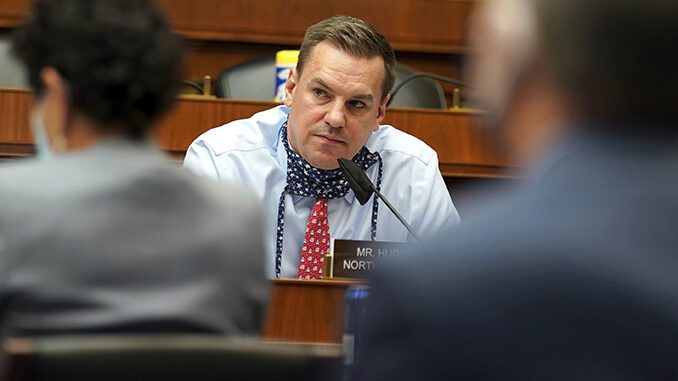
RALEIGH — When Rep. Ashley Hinson, a Republican from Iowa, filed H.R. 6619, the Unmask Our Kids Act, in the U.S. House of Representatives on Feb. 7, the first co-sponsor for the bill was Rep. Richard Hudson, a Republican representing N.C.’s 8th Congressional District.
The day after the bill was introduced, Hudson took to the House floor to argue for H.R. 6619. He said that there was hypocrisy evident as celebrities and high-profile politicians are repeatedly photographed unmasked in crowds, while they are unwavering in their insistence that children, who are at a much lower risk of being affected by COVID-19, are forced to wear masks in school. His press release specifically called out former Georgia gubernatorial candidate Stacey Abrams, who supports masking children, for not wearing a mask at a school visit where the students were made to mask.
“For hypocrite politicians who want to control your life, it’s rules for thee but not for me,” said Hudson. “It’s time to scrap these mandates and give parents the freedom to choose what’s best for their children. If it’s good enough for the politicians, it’s good enough for our kids.”
Hudson is also taking his fight back to his district, where he wants local school boards and health departments to eliminate any requirement for schools under their jurisdiction to mandate masking.
On Feb. 8, the same day that Hudson cosponsored the “Unmask Our Kids Act” and spoke on it in Congress, the Cumberland County Board of Education in his district decided to make masks optional. However, because the county’s health department had a county-wide indoor mask mandate, this policy shift by the school board was rendered ineffectual.
Dr. Jennifer Green, the Cumberland County health director, put an indoor mask mandate in place in August 2021, and it has remained in place since then. Hudson appealed directly to Green in a letter to rescind her mask mandate and allow schools to be mask optional in line with the school board’s vote.
“In addition to following the well-established science, I would further urge you to follow the parents,” Hudson wrote in the Feb. 11 letter. “Our local Cumberland County Board of Education made the decision to make masks optional based on both the existing science and their current roles as parents, educators, and local leaders. I respectfully urge you to follow their lead, and revise the August 2021 abatement order, in light of both the recent evidence and respected parental input.”
A few days later, on Feb. 16, Green announced she would remove the abatement order that was blocking the school board’s new mask-optional policy. Her decision would be effective at 5 p.m. on Sunday, Feb. 20. In addition, with Green no longer enforcing this order, the schools became mask-optional in Cumberland County that day, Feb. 16.
A press release from Hudson after this development claimed some credit for Green’s change of heart.
“After the state passed a law and the school board voted to make masks optional, I demanded the health department stop standing in the way,” Hudson said in the statement. “I am glad the county has made this overdue decision, and I will keep fighting to end these mandates across our state and country.”
The law that Hudson was likely referring to is the “Free the Smiles Act,” S.B. 173, which would block school districts across the state from imposing mask mandates on students. The bill passed both the House and Senate on Feb. 17. In the House, the bill received a veto-proof majority of 76-42, but in the Senate, it was two votes shy of the 30 votes needed for a three-fifths vote. Fortunately for Republicans, two from their caucus — Sens. Ralph Hise (R-Mitchell) and Jim Perry (R-Lenoir) — were absent, so if Gov. Cooper vetoes the bill, they would almost certainly vote with their party to override.
Cooper, though, is signaling he may be done fighting the battle to maintain mandates across the state for schools. He made an announcement the same day that he was now recommending districts do away with their mandates. While the details of this big change are unclear, it seems to signal there would no longer be any resistance from state Health Department officials when counties declared themselves mask-optional. Many districts announced immediately afterwards that they would follow the lead of places like Cumberland County and make masking optional for their students.
At the federal level, H.R. 6619 has been referred to the House Education and Labor Committee, but it is unlikely to pass a chamber run by Speaker Nancy Pelosi, a left-wing Democrat representing the San Francisco area of California. After Hudson’s comments on the floor, House Democrats voted not to consider the bill. With momentum across the country growing to unmask students and debate unlikely to go away, though, the bill, or another like it, may soon reemerge.



